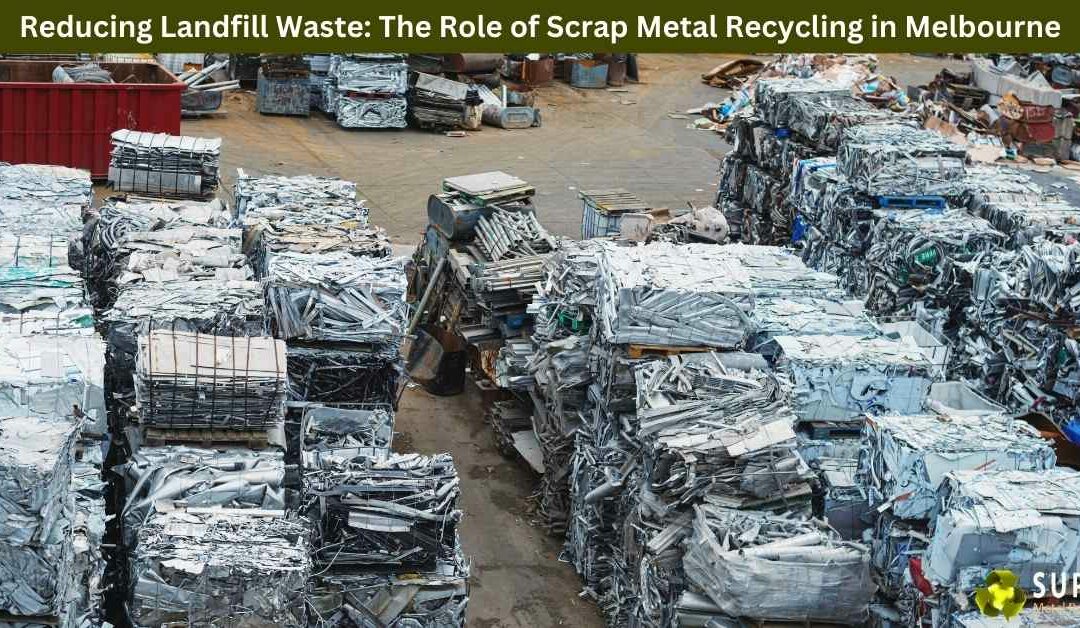In the bustling city of Melbourne, waste management is a pressing concern. Landfills are rapidly reaching capacity, posing significant environmental and health risks. Amidst these challenges, scrap metal recycling emerges as a powerful solution to reduce landfill waste and promote sustainability. This article delves into the critical role of scrap metal recycling in Melbourne, the environmental and economic benefits, and how businesses and residents can contribute to this vital initiative.
Understanding the Problem: Landfill Waste in Melbourne
Landfills are the traditional method for waste disposal, but they come with numerous drawbacks:
- Space Limitation: Melbourne’s landfills are nearing capacity, creating an urgent need for alternative waste management solutions.
- Environmental Impact: Landfills produce harmful greenhouse gases like methane, contributing to climate change. They also pose risks of soil and water contamination from leachate.
- Health Concerns: Communities near landfills face health risks due to exposure to pollutants and increased pest activity.
The Role of Scrap Metal Recycling
Scrap metal recycling plays a pivotal role in addressing landfill waste. By diverting metals from landfills, recycling conserves natural resources, reduces pollution, and supports the circular economy.
How Scrap Metal Recycling Works
- Collection: Scrap metal is collected from various sources, including households, businesses, and construction sites.
- Sorting and Processing: Collected metals are sorted by type (e.g., aluminum, steel, copper) and processed to remove impurities.
- Melting and Purification: The metals are melted in furnaces and purified to ensure high quality.
- Manufacturing: The purified metals are transformed into new products, ready to re-enter the market.
Environmental Benefits
1. Conservation of Natural Resources
Mining and extracting virgin metals is resource-intensive and environmentally damaging. Recycling metals reduces the need for mining, conserving natural resources such as ores and minerals.
2. Energy Savings
Recycling metals consumes significantly less energy than producing new metals from raw materials. For instance, recycling aluminum saves up to 95% of the energy required to produce it from bauxite ore. This reduction in energy use translates to fewer greenhouse gas emissions.
3. Pollution Reduction
By keeping metals out of landfills, recycling minimizes the risk of soil and water contamination. It also reduces air pollution associated with metal production processes.
4. Climate Change Mitigation
Lower energy consumption in metal recycling results in reduced greenhouse gas emissions, helping to combat climate change. Recycling one ton of steel can save 1.8 tons of carbon dioxide emissions.
Economic Benefits
1. Job Creation
The recycling industry generates jobs in collection, processing, and manufacturing. In Melbourne, scrap metal recycling supports numerous local businesses and employment opportunities.
2. Economic Efficiency
Recycling metals is economically beneficial as it reduces the costs associated with waste management and raw material procurement. Businesses that recycle can often sell scrap metals, generating additional revenue.
3. Resource Availability
Recycling ensures a steady supply of metals for manufacturing, reducing dependency on imported raw materials and stabilizing prices.
Case Studies: Success Stories in Melbourne
Sims Metal Management
Sims Metal Management, one of the largest metal recyclers in Melbourne, exemplifies the positive impact of scrap metal recycling. The company processes millions of tons of scrap metal annually, significantly reducing landfill waste and contributing to environmental sustainability.
Melbourne’s Construction Sector
The construction industry in Melbourne has increasingly adopted recycling practices. Companies like Delta Group specialize in recovering and recycling metals from demolition sites, diverting substantial amounts of waste from landfills.
How Businesses and Residents Can Contribute
For Businesses
- Implement Recycling Programs: Establish comprehensive recycling programs to collect and sort scrap metals.
- Partner with Recycling Companies: Collaborate with reputable recycling companies to ensure efficient processing of scrap metals.
- Educate Employees: Train employees on the importance of recycling and proper sorting techniques.
For Residents
- Separate Scrap Metals: Sort scrap metals from general waste and take them to local recycling centers.
- Participate in Community Programs: Engage in community recycling initiatives and support local recycling events.
- Educate and Advocate: Spread awareness about the benefits of metal recycling and advocate for better recycling infrastructure in your community.
Overcoming Challenges
While scrap metal recycling offers significant benefits, there are challenges to address:
1. Contamination
Contaminated scrap metals can be difficult to process. Businesses and residents must ensure proper sorting and cleaning of metals before recycling.
2. Infrastructure
Adequate recycling infrastructure is crucial for efficient processing. Melbourne must continue to invest in modern recycling facilities and technologies.
3. Public Awareness
Increasing public awareness and participation in recycling programs is essential. Educational campaigns can highlight the importance and benefits of scrap metal recycling.
Future Prospects
The future of scrap metal recycling in Melbourne looks promising, with ongoing advancements in recycling technologies and growing awareness of sustainability issues. Key trends include:
- Technological Innovations: Advancements in recycling technologies will enhance efficiency and reduce processing costs.
- Circular Economy Initiatives: Greater emphasis on circular economy principles will drive increased recycling and resource recovery.
- Policy Support: Stronger regulatory frameworks and incentives will support the growth of the recycling industry.
Conclusion
Scrap metal recycling is a vital component of Melbourne’s strategy to reduce landfill waste and promote sustainability. By conserving natural resources, reducing energy consumption, and mitigating pollution, recycling metals offers significant environmental and economic benefits. Businesses and residents alike play a crucial role in supporting recycling efforts. Through collective action and continued investment in recycling infrastructure, Melbourne can move towards a more sustainable and waste-free future.
If you are in Noble Park, Victoria 3174, and looking for a metal recycling service, this is the best way to visit us.
Super Metal Recycling
345 Frankston – Dandenong Road, Dandenong South VIC 3175
(03) 9706 4909


Recent Comments